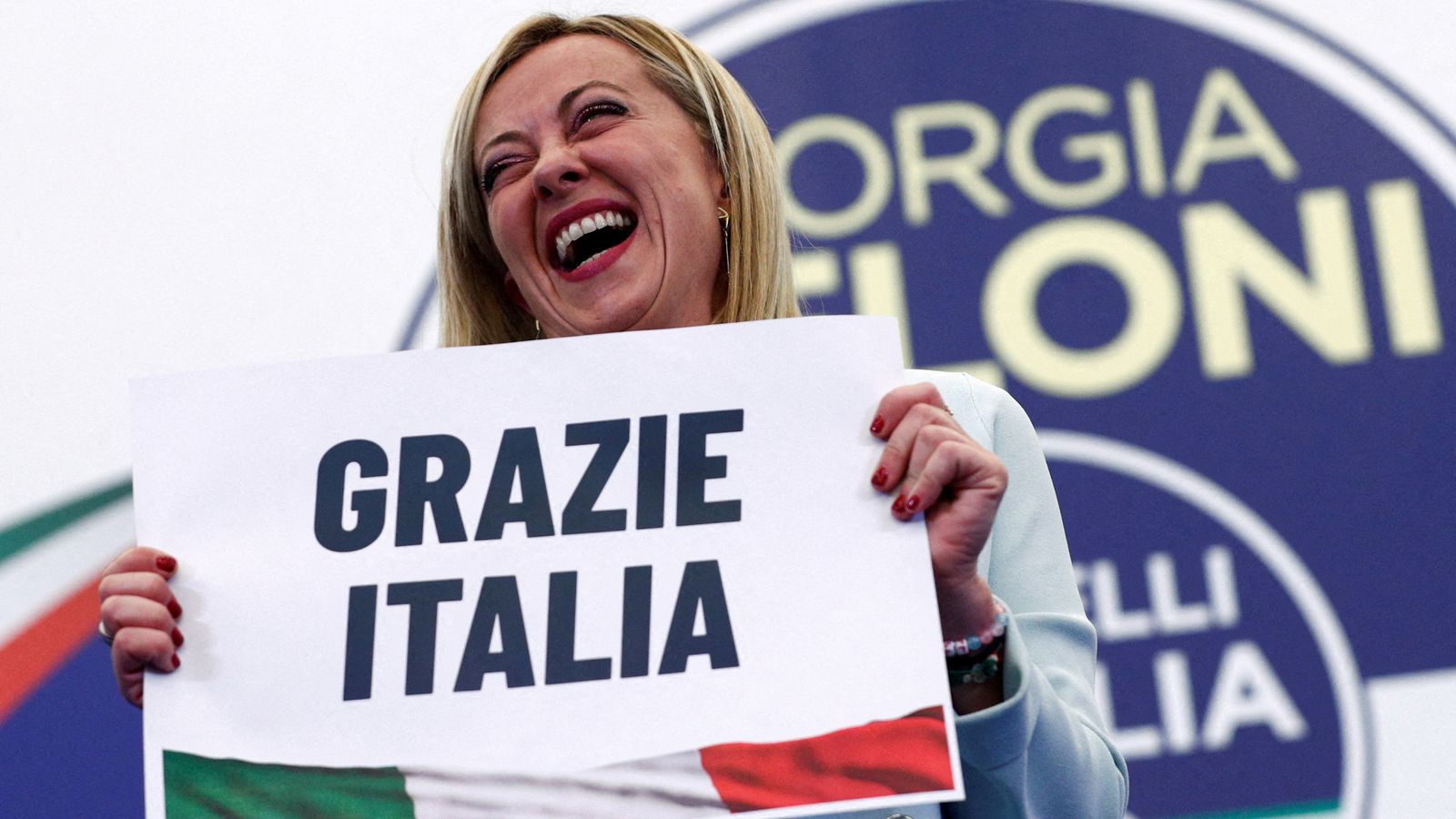Giorgia Meloni has achieved her ambition, leading her party to victory in the general election.
She has put together a coalition and, barring a pretty extraordinary constitutional hurricane, will be nominated as Italy’s next prime minister.
But then what? Here are a few things she will want to do soon.
Cut taxes for families and businesses
This was a core – and very popular – promise made by Ms Meloni and it’s hard to see how she can go back on it. The trouble is that tax cuts cost governments money. And Italy‘s national debt is already painfully large. She might decide to cut social security spending, but that would also be hard to justify at a time of soaring inflation. Which leads us to…
Deal with the cost of living crisis
Every politician now claims to have the solution, but exactly what it is we’ll have to see. There are promises about cutting taxes on energy and also about diversifying Italy’s infrastructure so it moves away from a reliance on Russian gas. That will include greater use of renewable energy and, possibly, nuclear energy. But Ms Meloni will have to come up with some concrete ideas, rather than vague aspirations.
Italy will move to the right, the question is just how far
Italy’s Democratic Party concedes defeat after exit poll puts far-right politician Giorgia Meloni on course to win
Dangerous far-right demagogue or free-thinking radical? Giorgia Meloni on verge of becoming Italy’s first female prime minister
Read more:
Who is Giorgia Meloni?
Italy will move to the right, the question is just how far
Please use Chrome browser for a more accessible video player
Make her mark in Europe
Ms Meloni is, by nature, a Eurosceptic, but I don’t see any chance of her pushing Italy towards leaving the EU. What she will want is a “more political and less bureaucratic” EU that does less to tie her hands, especially over economic plans. She may well want to grow the debt, which Brussels won’t like. She’ll criticise that as unnecessary interference. She’ll also be keen that the EU promotes her own brand of social conservatism based on so-called Christian and classical values.
Be a strong player in foreign policy
Ms Meloni is clear that she will maintain the strong support for Ukraine that was established by her predecessor, Mario Draghi. That might start a row with her coalition partners, notably the Putin-friendly Silvio Berlusconi, but I really doubt she’ll blink. What she will do is seek closer ties with like-minded leaders around the world. She’s already got political allies in Hungary, Poland, the Czech Republic and the United States. She’ll want to extend that network – Liz Truss can expect a call (and yes, Ms Meloni speaks good English).
Come up with a migration plan that works
Like lots of other politicians, Giorgia Meloni has discovered that strong, relentless rhetoric on the perils of immigration – and especially unauthorised immigration – is a vote-winner. So she said that the Italian Navy should be sent to the coast of North Africa to intercept boats; this is a plan few consider feasible. Her coalition partner Matteo Salvini is even more anti-migrant, so the coalition’s supporters (who tend to wildly overestimate the number of migrants arriving or living in Italy) are expecting action. The problem, as successive British governments have discovered, is that stopping migrants is a lot harder – and more legally fraught – than you might think.
Detoxify the brand
Ms Meloni is not a fascist, but people keep throwing that name at her. Her detractors have labelled her as a dangerous demagogue who won’t be able to unite the country. Some of that criticism probably helped her get elected. Her role as an outsider definitely attracted votes. But having been voted in, she now needs to prove her mettle by actually leading the country. Italian politics is so precarious and volatile that another “radical outsider” will come along soon. Ms Meloni will have to become a proven leader if she wants to stay in the job for the long term.








